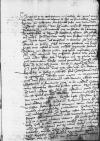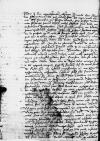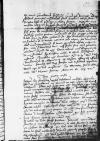⌊⌋ ad te ex oppido ⌊Palamos⌋ in Celtiberis[1] die 1527-05-27⌊XXVII-a Maii1527-05-27⌋, quo etiam arbitrabar nos abituros esse, sed res secus accidit. Superveniens enim veredarius sive, si malis written over ...⌈... illegible⌈...... illegible⌉malismalis written over ...⌉, posta nos unum diem impedivit. 1527-05-28⌊XXVIII-o die1527-05-28⌋ sub noctem conscenso myoparone statueramus navim onerariam, quae, ut solutior esset liberiorque ad velificandum, in altum se contulerat, assequi, sed res secus accidit, quandoquidem nocte tota frustra consumpta nec inventa navi ob tempestatem et tenebras, sub diluculum redimus in portum. Nec eo magis perterriti autem sumus, ientati enim refectis iam viribus rursus experimur fortunam tandemque non obstante pruina, quae visum impediebat, quaesitam orig. quesitam⌈quaesitamquaesitam orig. quesitam⌉ navim attingimus eaque conscensa statim vela pandimus medio vere or fere⌈v written over f⌈fvv written over f⌉erevere or fere⌉ ⌊Aeolo⌋, ⌊Neptuno⌋ autem ita placido, ut num paper damaged⌈[m]m paper damaged⌉quam meminerim vidisse minus procellarum toto tempore, quod fuit ad Kalendas usque Iunias, hoc est ad quintum usque diem, quem e portu solvimus. Tunc inito consilio, cum iam litora orig. littora⌈litoralitora orig. littora⌉ ⌊Massiliae⌋ et ⌊Galliae Narbonensis⌋ fere praeteriissemus, visum est operae pretium orig. precium⌈pretiumpretium orig. precium⌉ demissa navi magna, in myoparones, quos duos solum habebamus, nos conicere orig. coniicere⌈conicereconicere orig. coniicere⌉, relicta omni supellectile et familiaribus quoque et ad custodiam galeone uno, ⌊Monoecum Herculis⌋ portum petituri. Nam reliquum paper damaged⌈[uum]uum paper damaged⌉ omne litus orig. littus⌈lituslitus orig. littus⌉ infidum est, illud autem infidissimum, quod Ligus[ti]cum or Liguscum⌈Ligusti paper damaged⌈[ti]ti paper damaged⌉cumLigus[ti]cum or Liguscum⌉ est, ⌊Gallis⌋ ⌊Savonam⌋ obtinentibus, quorum classis totum mare hoc infestat.
Et vide, per Christum, quam id bene ceciderit nobis! Pridie enim Kalendas Iunias, hoc est die Sabbato, septem b written over tr⌈trbb written over tr⌉iremes ⌊Maurorum⌋ totum litus orig. littus⌈lituslitus orig. littus⌉ per paper damaged⌈[r]r paper damaged⌉currerant, quas insecutae orig. insequutae⌈insecutaeinsecutae orig. insequutae⌉ quattuordecim Gallicae triremes mutato consilio ad portum nostri ⌊Monoeci⌋ deflexere spe intercipiendarum trium triremium Genuensium, quae eo in portu anchoras iecerant. Sed male habiti tu paper damaged⌈[u]u paper damaged⌉tatique ⌊Galli⌋ a domino Monoeci amissis aliquot e classiariis nimbo globorum, qui ex muris huius arcis excutiebantur, amisso adhaec galeone uno, sub noctem me paper damaged⌈[e]e paper damaged⌉liorem experturi alibi fortunam ⌊Vigintimilia⌋ oppidum et deinde aut in ⌊Corsicam⌋ aut ⌊Savonam⌋ contenderunt.
 AAWO, AB, D. 3, f. 31v
AAWO, AB, D. 3, f. 31v
Pridie quam huc appullissemus, obscura iam nocte hinc solverat bergantinus ille, qui nuntium orig. nuncium⌈nuntiumnuntium orig. nuncium⌉ fert de capta urbe ⌊Roma orig. Rhoma⌈RomaRoma orig. Rhoma⌉⌋[2] deque ⌊pontifice⌋ in potestatem redacto, quae profecto victoria, mea sententia, parvam laetitiam nobis adferre iure debet, amisso fortissimo ⌊i written over d⌈dii written over d⌉mperatore⌋, cuius similem nescio, an hodie ⌊Hispania⌋ ⌊Gallia⌋ve habeat - hoc ⌊illi⌋ praemium orig. premium⌈praemiumpraemium orig. premium⌉ fortuna rependit – et profecto ego id mihi id semper persuaseram, cuius rei puto esse te etiam testem. Sed pontifices quidem et alios capere poterimus, talem autem ⌊ducem⌋ haud facile, reor, recuperaturos esse. Quo fit, ut plurimum dubitem de reliquis mihique fere persuadeam futurum, quod et tu novissimis litteris tuis tetigisti. Sed haec talia sunt.
Enimvero illustris dominus ⌊cancellarius⌋ numquam melius valuit, nihil mali written over ...⌈... illegible⌈...... illegible⌉malimali written over ...⌉ perpessus, immo ne nauseam quidem fere. Quorsum hinc sit abiturus, nescio adhuc, nam cum ⌊eo⌋ loqui hodie minime licuit tot negotiis orig. negociis⌈negotiisnegotiis orig. negociis⌉ occupato, quae illi faciunt litterae ad curiam scribendae. Reor autem aut ⌊Genuam⌋ concessurum esse, aut ⌊Vercellas⌋, exspectaturumque responsum ⌊caesaris⌋, quid sibi faciendum omittendumve sit.
Aiunt ⌊pontificem⌋ aut ⌊Caietam⌋, aut ⌊Neapolim⌋ perductum esse in ⌊Hispanias⌋ navigaturum. Neque nos etiam, ut reor, deerimus adventui. Nescio tamen, quid adhuc facturus sit. Me sane taedet orig. tedet⌈taedettaedet orig. tedet⌉ huius otii orig. ocii⌈otiiotii orig. ocii⌉, quippe qui malim in negotio orig. negocio⌈neg superinscribed⌈negneg superinscribed⌉otionegotio orig. negocio⌉ versari. Et solus ego citra gravem invidiam domesticorum et familiarium ita vivere non t non possum, praesertim cum desit ⌊Achates⌋ aliquis, in cuius sinum subinde mea infundam. Feram tamen aequo fortique animo omnia neque optimum ⌊senem⌋ et prudentissimum, donec is voluerit, deseram. Magna mihi spes est de omnibus, uti aliquando tibi dixi. Non potui ad te quicquam scribere, cum desint τα γραμματα, sunt enim in carissimis orig. charissimis⌈carissimiscarissimis orig. charissimis⌉ rerum mearum, quae in navi magna permansere. Ad quam myoparones aliquot mittimus et supellectilem, et relictos ibidem familiares exportaturos orig. exsportaturos⌈exportaturosexportaturos orig. exsportaturos⌉.
Homines aliquot inepte lepidi apud vos iocis scommatisque adversum me agunt, quos ne litteris quidem inserere verentur, ridiculi sane futuri, si me aequum pugilem, et quales ipsi sunt, invenirent. Omnis culpa est mea, quod abierit
 AAWO, AB, D. 3, f. 32r
ex curia ⌊cancellarius⌋ supremus, cuius ipsi bonitate ad explendas privatas cupiditates suas hactenus abusi sunt. Tu vero testis es, quid ego qualiterque fecerim. Neque ⌊ille⌋ meo consilio indiguit, quippe senex et prudens et re praep determinata triennio, priusquam Cornelium novisset. Adiciunt orig. Adiiciunt⌈AdiciuntAdiciunt orig. Adiiciunt⌉ litteris suis, quas ad consortes scribunt, et ⌊caesarem⌋ mihi indignari, quod ego purum putum mendacium esse scio, quippe quem non latet, qua in fossa cauterium sit. Haec ad te volui scribere, ut si quando ad te veniant. Venient autem aliqui per transennam illis meam excusationem, si tamen excusatio est, ubi culpa non fuit, neque a bonis etiam viris, nisi stolidi sint, etiam putatur, obtrudas.
AAWO, AB, D. 3, f. 32r
ex curia ⌊cancellarius⌋ supremus, cuius ipsi bonitate ad explendas privatas cupiditates suas hactenus abusi sunt. Tu vero testis es, quid ego qualiterque fecerim. Neque ⌊ille⌋ meo consilio indiguit, quippe senex et prudens et re praep determinata triennio, priusquam Cornelium novisset. Adiciunt orig. Adiiciunt⌈AdiciuntAdiciunt orig. Adiiciunt⌉ litteris suis, quas ad consortes scribunt, et ⌊caesarem⌋ mihi indignari, quod ego purum putum mendacium esse scio, quippe quem non latet, qua in fossa cauterium sit. Haec ad te volui scribere, ut si quando ad te veniant. Venient autem aliqui per transennam illis meam excusationem, si tamen excusatio est, ubi culpa non fuit, neque a bonis etiam viris, nisi stolidi sint, etiam putatur, obtrudas.
Si quid de ⌊rege Dano⌋ audias, non dedignaberis ad me scribere. Ego vicissim nihil te celabo successuum nostrorum. Commenda me humiliter reverendo et excellenti domino ⌊vicecancellario⌋ et domino ⌊Alexandro⌋, et domino ⌊Hallero⌋ offerque illi officium meum. Familiae etiam tuae fausta omnia et felicia orig. foelicia⌈feliciafelicia orig. foelicia⌉ apprecor. Deus optimus te diu conservet.
 AAWO, AB, D. 3, f. 32r
ex curia
AAWO, AB, D. 3, f. 32r
ex curia 


